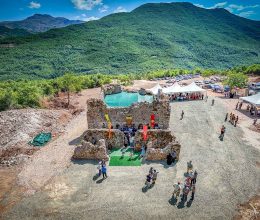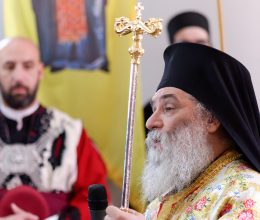A homily by His Grace, Bishop Partenij of Antania, given on the Sunday of the Holy Forefathers at Divine Liturgy in the Church of St. Clement of Ohrid at Plaoshnik on December 26th in the year of Our Lord 2021.

Your Beatitude, Archbishop Stefan of Ohrid, Macedonia, and Justiniana Prima,
Your Eminence, the honored Bishop of this God-protected Diocese, Metropolitan Timotej,
Your Graces,
Honored fathers,
Beloved brothers and sisters in Christ,
By the grace of God, we are already approaching the Holy Nativity of Christ and the Church is preparing us for this great, joyous feast of the Lord, for this perfect opportunity for our lives to be filled with meaning. This day is a most important opportunity for Christ to be born in us. In this way, we can experience Christmas in a right and powerful way. We will experience this power only if we turn out hearts into the humble yet welcoming manger of Bethlehem.
Today is liturgically dedicated to the Holy Forefathers, who are those who pleased God in the centuries before the birth of Christ. They prophesied about the Messiah and awaited His appearance in the flesh as the Son and Word of God, the fulfillment of the Old Testament, and the coming of grace. The church hymnography for this second Sunday before the birth of the Savior celebrates all the patriarchs, judges, prophets, and righteous ones from the Old Testament, starting from the first-created Adam and Eve, all the way to the Holy Forerunner and Baptist John. We are shown their longing, expectation, and hope in Messiah’s coming to the world. With divine praise, the hymnographer presents and honors the God-man Christ’s fleshly ancestors as well as the righteous who accepted God’s call to become participants in the mystery of Christ’s salvation of the human race. These are people who lived before Christ, in the time of the law and not of grace, in a world that was usually difficult, hopeless, and filled with spiritual darkness. They lived in painful anticipation and desperate longing for the promised Messiah. Despite all this, they managed to live righteous and honorable lives through their unshakeable faith in God and His promises and revelations concerning the coming of a Savior. Thus, they were spiritually with Christ even though they lived before His Incarnation.
Therefore, we now contemplate them with exuberance and wonder, as we learn from the humility and courage of Moses, the patience of Job, the faith of Abraham, the vision of Jacob, the suffering of the Three Youths in the Babylonian Furnace, and the hope, patience, and longing that all the Old Testament heroes of faith experienced as they waited for the Redeemer of Mankind, Christ the Savior.
For the Holy Forefathers who lived before Christ’s Nativity, spiritual life was painful and agonizing, filled with many sufferings, dim images, and painful expectations because they lived under the yoke of the law. We, however, live in the time of grace, and salvation and deification are much more easily attainable. They did not have Christ among them as a man, while we constantly feel His presence among us and are united with Him through the Church’s Holy Mysteries. They did not have a clear or coherent idea about the spiritual world or the mysteries of God’s love and mercy, and yet, they received His promise with faith and attained salvation. Today we live the open invitation to the royal supper of deification, of God’s beauty and perfection. But the question is how much we sit with God at His bounteous supper He has invited us to.
That is why today’s Parable of the Great Supper is directly related to the Mystery of the Incarnation.
In the Gospel reading we just heard, Christ says one man prepared a great banquet and invited many people (Luke 14:16). In their inspired interpretations, the God-bearing Fathers of the Church say that the “one man” refers to God the Father, Who sent His Only Begotten Son to become a Man, in order to raise man up to God’s heights, to make him a god by grace. The banquet signifies the Divine Eucharist, the Divine Liturgy, as well as the overall sacramental life of the Church, where God’s love is freely given to us as a great feast. Through Holy Communion, God Himself cleanses us from sin, brings us humility of conscience and thoughts, inner peace, joy of the spirit, peace of heart, delight in our souls, salvation, and deification.
The Gospel says he invited many people, which actually means he invited everyone. God’s invitation excludes no one. All of us, wretched, promiscuous, bad, unworthy, cunning, and evil, are all invited to dinner with the Son of God, Who came to set us aright, fix us, and give us the opportunity to become human again in the original sense of the word, return to being in His Image, His companions and friends, His brothers and sisters who sit with Him at the Feast of Holiness. Through His Church and His priests, He calls us as we are, impure and sinful, in order to purify and justify us, to make us His own, to sanctify us, and to deify us.
However, notice carefully what Christ says. In the parable, He mentions invitations, not coercion. This means that God does not force us to come to Him, He does not violate our freedom, but only calls us with love. He invites us so that with good and free will we can approach Him with desire and remove the filth from our souls, reject sin and evil in ourselves, and do away with the cunning of thoughts and the coldness of egoism. Let us clothe our souls with garments worthy of a royal banquet: good deeds, charity, forgiveness, generosity, and love for our neighbors. Surely you remember the Exaposteilarion from the first days of Holy Week which says: “Thy Bridal Chamber, O my Savior, I see adorned, but I have no wedding garment to enter.” The wedding garment we need to enter the chamber of Christ’s majesty is woven from the love of God and neighbor, from generosity and spiritual integrity. Consequently, in order to sit worthily at table with God, it is necessary to transform egoism into community, individualism into relationships, phobias and anxiety into charity and diligence, hatred into forgiveness, and narrow-mindedness and fanaticism into a space for coexistence and cooperation for doing good. We must reject doubt and hopelessness and put faith and hope in their place, based on discernment, endeavoring in prayer, and real effort.
Then we will be able to feel the blessing of attending the Lord’s Supper and of truly living the Church’s sacramental life. Then we will be able to truly taste the menu and the various dishes of the heavenly meal. St. Cyril of Alexandria says that this meal consists of four dishes, which a person can spiritually feed on, enjoy and savor. The first dish is the forgiveness of sins. The second, adoption, becoming the sons of God by grace. The third plate is communion with the Holy Spirit, because only by participating in the Eucharistic supper, only by responding to the invitation sent by Christ, can we become partakers of the Holy Spirit, with His uncreated energies that enlighten and deify us. The fourth dish is the Kingdom of Heaven: true, eternal life. All this is offered to us as a gift, without any merit on our part. That is why Christ invites us in the Gospel: Come, everything is already prepared! Everything is prepared by Him, all that remains is for us to respond to His call with love, gratitude, and humility.
![]()
Beloved, the days are upon us in which we are given the opportunity to prepare for our communion with Christ at the glorious table of His abundant bounty. He descends from Heaven to Earth, to exalt us to our original beauty and dignity. That is why the Church calls out to us during this period with the Katavasia for Nativity: “Christ is born – glorify Him! Christ comes from Heaven – go to meet Him! Christ is on Earth – be exalted!” Thus, let us not be ungrateful or careless about Christ’s sweet call, of God’s unobtrusive invitation to dine with Him in His beauty and goodness. Let us not show ourselves to be like the careless invitees in today’s Gospel, who cling to the things of this world, be it possessions, wealth, comfort, and bodily pleasures, or the obsessive and mentally unhealthy attachment to work, family, spouses, and social positions. For the sake of the temporary, they lost what is eternal, for the sake of the seemingly attractive they lost what is truly beautiful. Let’s use these days, not for media-imposed consumerism or the superficial attractiveness of consumer society, but for compassion and loving concern for our fellow man, our neighbor, for the man we have condemned, underestimated, insulted, or belittled. Let us show compassion to the poor, the sick, the weak, and the lonely of whom there are many in this world. Let us love those whom we have not yet forgiven and those for whom we have not found space in our own hearts, those whom we see as sinful, unworthy, miserable, marginal, or insignificant. The Love that takes on a human body on Christmas does not set boundaries or limitations, does not care for prejudices or divisions, but embraces everyone equally, embraces every single one, regardless of time or space, ethnicity, or social status. The Angel who proclaimed the Nativity to the shepherds of Bethlehem announced great joy, which will be for all people (Luke 2:10). So, let’s spend this Christmas not only with beautiful pictures on social media, with gorgeous clothes, decorations, and festal tables, but above all, by seeing the image of God in our neighbor.
I thank everyone and wish you all a blessed Nativity of Christ.















